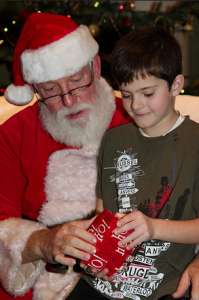 U.S. Army Corps of Engineers photo by Carol E. Davis, Flickr Creative Commons
U.S. Army Corps of Engineers photo by Carol E. Davis, Flickr Creative Commons
Last year, during a shared bus ride, two teens from a Buxmont Academy school upset a group of first- and second-grade Catholic school students by telling them there was no Santa Claus.
Since Buxmont is an IIRP model program that employs restorative practices, when the principal of the Catholic school called to report the event, Buxmont staff suggested a circle to hold the teens accountable and give them the chance to apologize.
Buxmont counselor Jean Scott took the two boys who made the offending comments to the Catholic school to conduct the circle, along with two other youth to serve as friends and emotional support for the boys. They met with the principal first.
“The principal was challenging but not judgmental,” says Scott. “He asked, ‘Did you ever have a dream crushed?’”
The boys were remorseful, and the young children were brought into the office so the boys could speak to them directly.
“You have to picture these really little kids in Catholic school uniforms sitting in the principal’s office with our much older kids,” says Scott.
The boys took responsibility. They acknowledged that what they’d said wasn’t nice and apologized to the children. The mother of one of the boys, who was also present, expressed her sadness.
The two supporters – the friends of the boys – felt empowered to help out, too. They added that they didn’t want the children or the principal to think badly about the kids at Buxmont and made assurances that this would never happen again.
The little children mostly just listened, possibly because they were unfamiliar with the circle process. But the fact that these big boys were actually apologizing to them clearly made an impression.
Scott described the circle as “powerful and amazing.” The principal thanked the boys profusely for coming to address the issue with a circle, and all the participants were pleased with the outcome.
Perhaps even more important, the circle became an opportunity to share the benefits of restorative practices with the wider community.
